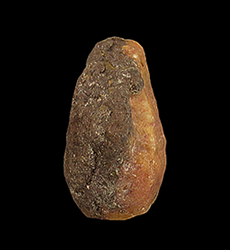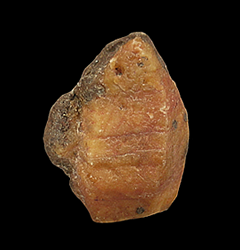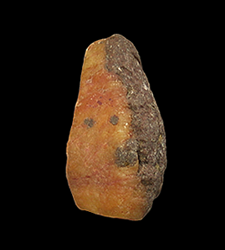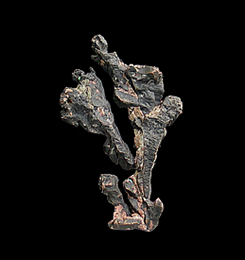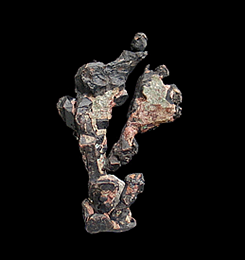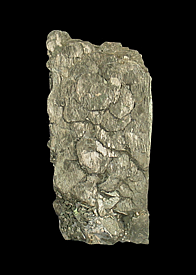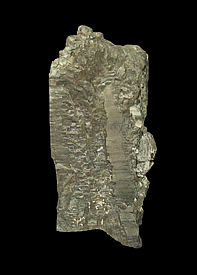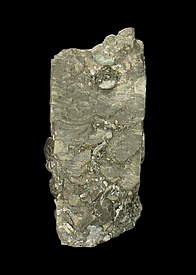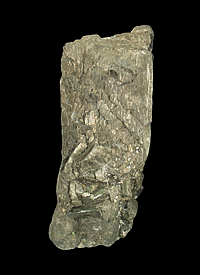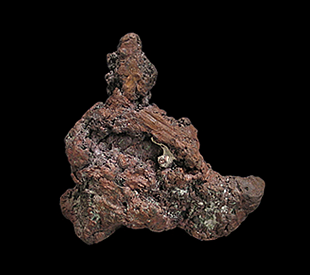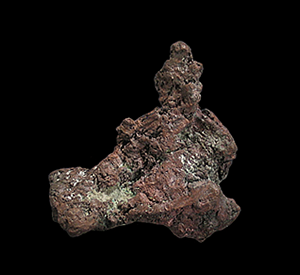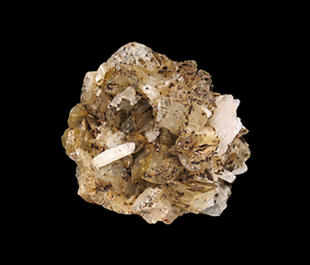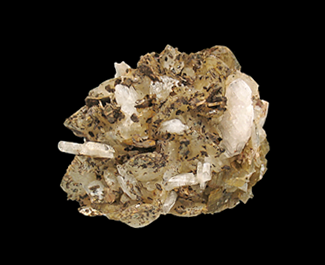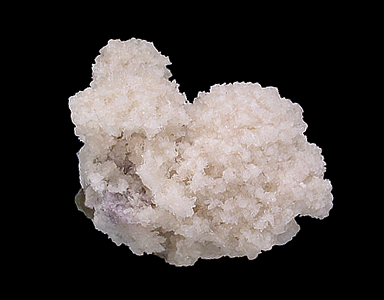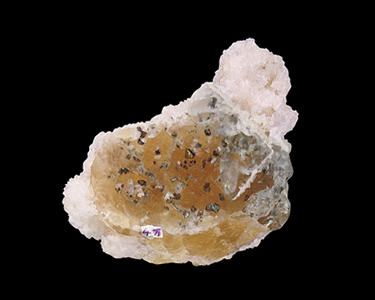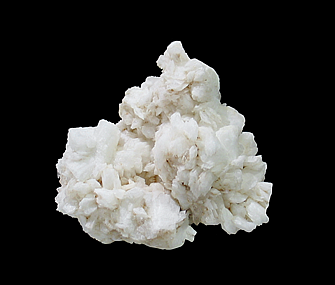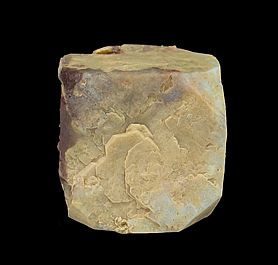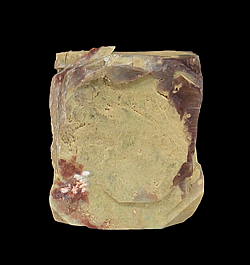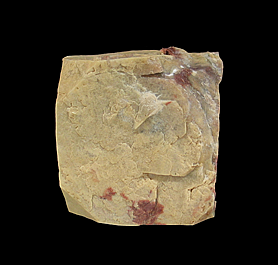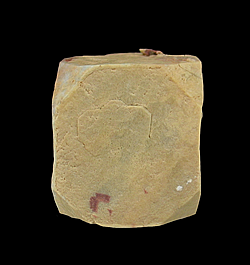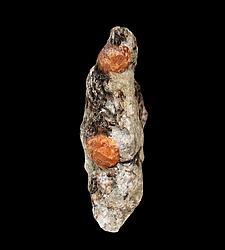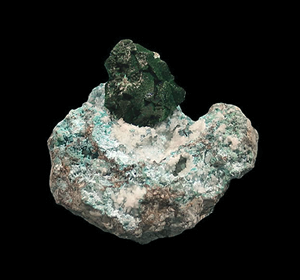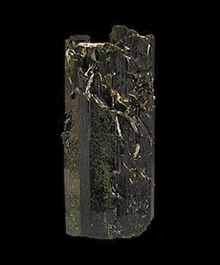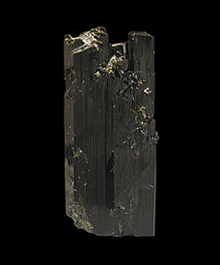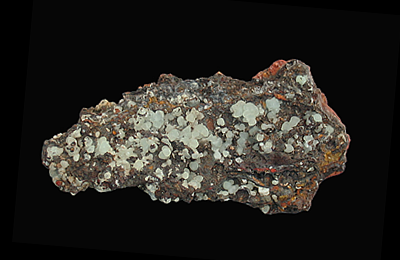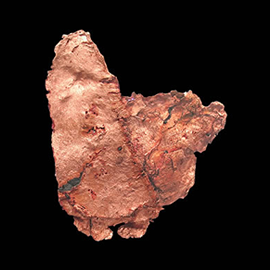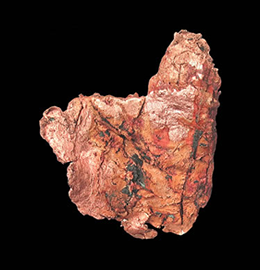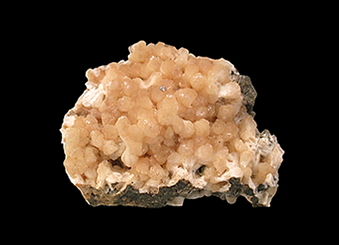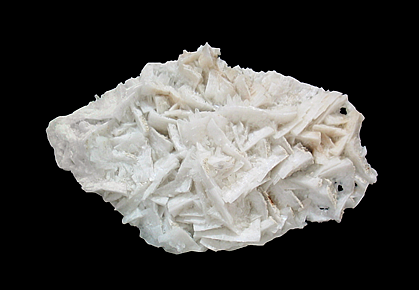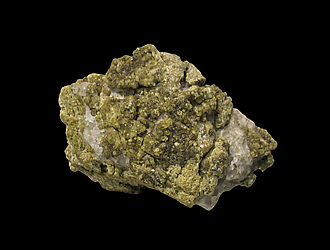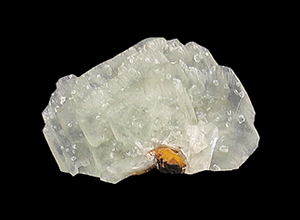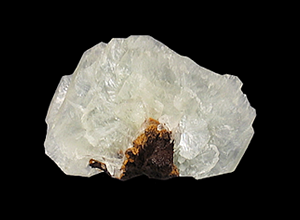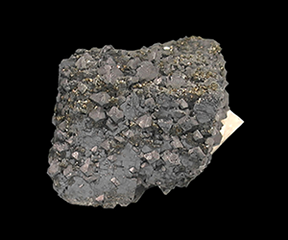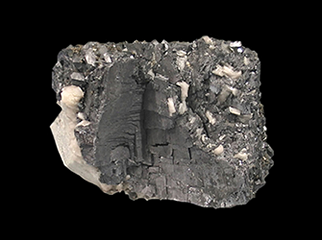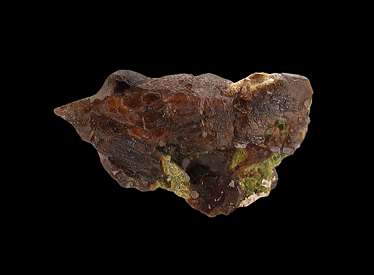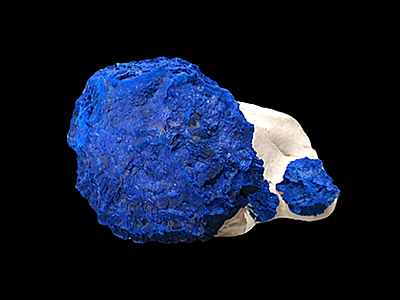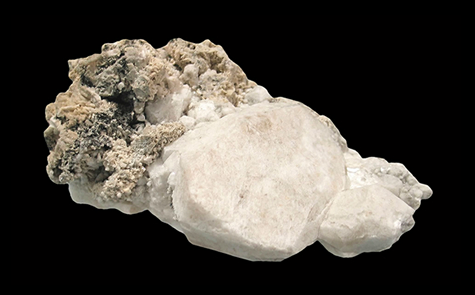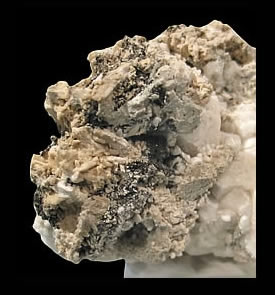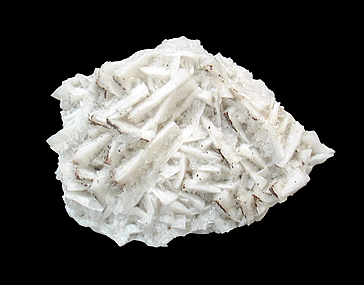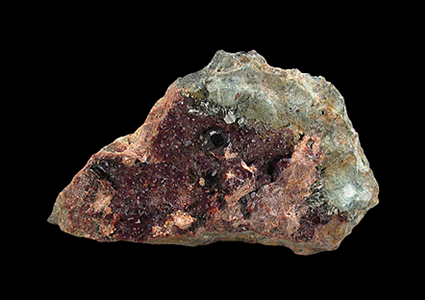|
|||||||||
|
Mixed Mineral SpecimensHOLIDAY SALE 50% OFF ALL MINERAL SPECIMENSReturn to Mineral Specimen Galleries
|
|||||||||
C-255 Corundum
variety Sapphire Bawmar, Kyatpyin North, Mogok Township, Pyin-Oo-Lwin District, Mandalay Region, Burma 5.3 x 4 x 2.7 cm Here we have an alluvial Sapphire crystal from one of Asia's more prolific gem producers. This crystal still has some of its matrix attached. This Sapphire has a medium-yellow color with hints of red caused by iron that has leached from the piece of the crystal's host rock that is still attached. Despite being water-worn, this Sapphire still has defined crystal faces. This specimen would make a colorful addition to any collector's mineral cabinet.
C-324 Copper SOLD #3 Shaft, Northwestern Mine, Central, Keweenaw County, MI 6.7 x 3.8 x 1.3 cm A sculptural example of Michigan Copper. This specimen features branching, elongated crystals of Copper with a rich patina. This specimen hails from the Northwestern Mine. One of Michigan's oldest Copper mines, the Northwestern Mine operated from 1845-1865.
P-074 Pyrite
Buick Mine, Bixby, Iron County, MO 10.4 x 4.9 x 4.8 cm A stout, Pyrite bar from the famous Buick Mine in the Viburnum Trend of Missouri. This specimen exhibits a medium lustre and has a slight twist which is common for these “bars”. These specimens were recovered over 40 years ago and are a rare and desirable classic from the Viburnum Trend.
C-230 Copper Iroquois Mine, Mohawk, Keweenaw County, Michigan 7.6 x 6.7 x 2.5 cm. A chunky example of Michigan float Copper, which refers to to glacially transported native Copper. This specimen has visible striations caused by glacial scouring. This same event accounts for the slightly rounded form. Despite this, the specimen still exhibits most of its original crystalline form.
S-141 Siderite,
Dolomite, Albite, Pyrrhotite and Quartz Morro Velho Mine, Nova Lima, Iron Quadrangle, Minas Gerais, Brazil 9 x 7.6 x 6.4 cm This specimen hails from the world's oldest continually producing gold mine, started in 1725. Present on this specimen are lenticular crystals of Dolomite to 2.4 cm. and very clear Siderite crystals to 2.0 cm. in size. Most notable though, are the numerous crenellated Albite crystals measuring up to 3.3 cm. in size. Albite is not often seen on specimens from this famous location, especially in crystals this large. Both Siderite and Dolomite from Morro Velho are considered world-class in quality. Also found on on this specimen are clear and gemmy Quartz crystals and the ever present Pyrrhotite.
S-131
Strontianite on Fluorite with Chalcopyrite Minerva #1 Mine, Ozark-Mahoning Group, Cave-in-Rock, Hardin County, IL 9.7 x 6 x 5.7 cm This specimen features white to colorless Strontianite crystals on a matrix of crystallized Fluorite. The spiky, minute crystals in radiating tufts, as seen on this specimen from the Minerva #1 Mine are a great example of the species from this closed locality. This specimen has a lot of presence. Strontianite is a rare carbonate mineral (strontium carbonate) and one of only a handful of known strontium minerals. Crystals of this mineral species are much rarer than the massive form.
F-222 Adularia Hamilton Hill Mine, Jessieville, Garland County, AR 8.3 x 7.6 x 4.3 cm A mound of bone-white Adularia crystals. The specimen has a slightly pearlescent lustre. This specimen is from a small project in 2013 that yielded Adularia and Quartz combination specimens. Hamilton Hill has been worked intermittently for over 150 years. Quartz crystal mining was begun at Hamilton Hill shortly after the Civil War by William Hamilton and John Neal. Hamilton Hill reputedly produced the largest volume of crystals of any of the old mines in the Garland County area. It was particularly well known for producing important collector specimens.
A-124 Apophyllite Mahodari, Sinnar, Nashik District, Maharashtra, India 5.8 x 5.7 x 5 cm A stout and fully formed crystal of umber-yellow & brick-red Apophyllite. This floater crystal has a good form and a good lustre. These unusual specimens of included Apophyllite from several small finds in 2003-2004 became instant classics when they first appeared. Marketed as “Marshy Apophyllite” the inclusions were said to be Mozartite, a rare Ca-Mn silicate, but that has since been discredited. The inclusions were later determined to be clays or Chlorite. The red inclusions are iron oxides.
G-159 Spessartine
on Muscovite Nani Hill, Loliondo, Ngorongoro District, Arusha Region, Tanzania 6.3 x 3.8 x 1.9 cm This specimen consists of two orange-colored Spessartine crystals, the largest measuring 1.1 cm across, in a mica rich matrix. Complete all around and damage-free. Orange-colored Spessartine garnets are not that common and are only found in a handfull of localities worldwide.
M-022
Malachite, Chrysocolla & Calcite Katanga Copper Zone, Katanga, Congo 5.5 x 6.7 x 4 cm. This Specimen features the classic Katanga matrix of Chrysocolla and Calcite upon which is perched a cluster of wedge-like Malachites. The green-colored wedges are so dense at their centers that they appear smooth, grading to a velvet-like texture at their tips.
E-027 Epidote Dom Gaspar, Bahia, Brazil 6.8 x 3 x 1.3 cm. Here we present a slender prismatic crystal of Epidote with a crenellated termination. This is an excellent example of Brazilian Epidote that shimmers in the light and the little pistachio-colored crystals on the front are a nice accent.
S-183 Smithsonite Hilarion Mine, Agios Konstantinos, Lavrion Mining District, Lavreotiki, Attica, Greece 11 x 5.5 x 3.2 cm This specimen features many crystals of the Zn-carbonate mineral Smithsonite on a contrasting gossan matrix. The Smithsonite crystals have a faint sea-foam-colored hue. The mines of Lavrion are famous for the multitude of minerals that it has produced. Over the last 2,000-plus years this location has been worked Intermittently. The last mining ceased in 1984. Smithsonite is named after British mineralogist and chemist, James Smithson, who bequeathed the funds that made possible the founding of the Smithsonian Institution.
C-185 Copper White Pine Mine, Ontonagon County, Michigan 8.6 x 7 x 1 cm. Here we offer a sheet of native Copper from the White Pine Mine of Michigan. This specimen is as bright as a newly minted penny. This Copper specimen came out of the earth just like this, having formed as a thin seam running through layered shale matrix. The White Pine was one of the country’s largest Copper mines dating back to 1880 and was worked until 1995. Once readily available, these “sheet Coppers” are scarce these days.
S-147 Stilbite Paterson, Passaic County, NJ 6.8 x 4.9 x 3.3 cm. A specimen of well-terminated, yellow-orange crystals of Stilbite measuring up to 8 mm on a basalt matrix.
F-268 Adularia
variety Valencianite (type locality) Valenciana Mine, Municipio Guanajuato, Guanajuato, Mexico 13.6 x 8.5 x 1.7 cm A good sized plate of lustrous crystals of the variety of Feldspar known as Valencianite, whose name comes from the mine that it was first identified from. This specimen features crystals measuring up to 3.2 centimeters, many of which exhibit a slight curvature. A good example of a lesser known variety of Feldspar.
G-145 Andradite
Garnet Tepustete Ranch, Álamos, Municipio de Álamos, Sonora, Mexico 8.2 x 5.2 x 3.1 cm Numerous green to dark green Andradite crystals scattered on a matrix of Quartz. The crystals on this specimen are mostly translucent. Examples of this material are seldom seen for sale.
B-209 Barite Congreso-León Mine, San Pedro Corralitos, Municipio de Casas Grandes, Chihuahua, Mexico 4.6 x 3.1 x 2.1 cm This aesthetic specimen of Barite consists of very thin group of pointed tabular blades to 3.3 centimeters perched on gossan matrix. There is also a secondary growth of smaller Barite crystals on one side of the specimen. These specimens were collected by mineral dealer Benny Fenn around 1970-71.
G-087 Galena
and Chalcopyrite Joplin Field, Tri-State District, Jasper County, Missouri 5.5 x 5 x 4.5 cm. This is an old Tri-State Galena specimen that is truly amazing to look at, in that its surface of the main crystal is completely covered with small, flat-topped epitaxial Galena crystals resulting from a second generation of growth. These type of Galena crystals are known as hobnail habit Galena. Hobnail habit, especially in Galena, describes predominantly cubic crystals with "hobnail" overgrowths consisting of isolated octahedral or cuboctahedral crystals crystallographically oriented on the cube faces. The main crystal is complete, with the back side being L-shaped where it was wrapped around the euhedral matrix rock. The Galena also has many tiny, golden Chalcopyrites, which add to the specimen's attractiveness.
G-125 Andradite Garnet with Epidote SOLD Marki Khel, Spin Ghar Range, Khogyani District, Nangarhar Province, Afghanistan 5.7 x 3.5 x 1 cm. This is one of the more weirdly-formed Garnets crystals that I have come across. This specimen consists of a cinnamon-brown Andradite that looks as if it has been squeezed while it was forming and is accented by several small areas of pistachio-green Epidote. This uncommonly-shaped Garnet is 100% complete all-around, has no damage with a great lustre as well as some areas where it is transparent. Quite different from your usual Marki Khel Garnet specimen.
A-113 Azurite SOLD Malbunka
Copper Mine, Areyonga, Gardiner Range 9.4 x 7 x 4.4 cm An outstanding example of an Azurite “sun” from the Malbunka Copper Mine. The Azurite on this specimen has a beautiful and rich blue color as well as an interesting texture with good (as far as Azurite from this location is concerned) crystallization. The largest Azurite on this specimen measures 7 x 7 cm and is unusually thick. At 2.1 cm it is one of the thickest Azurite nodules that I have seen from this location. 4 or 5 mm in thickness is what you usually get. These Azurite “suns” form in a fashion that is unlike any other Azurite that I've seen. These flattened discs of Azurite are formed between layers of Kaolinite which forces them to grow in a laterally compressed, radiating manner. A top quality example of this material.
AH-028 Analcime
with Synchysite SOLD Poudrette Quarry, Mont Saint-Hilaire, Québec, Canada 10 x 5 x 4.5 cm. This large specimen, upon first glance, appears to be a rather typical-looking cluster of Analcime crystals, but this specimen is more than that. The dark gray region is composed of hundreds of 0.5 millimeter disk-shaped crystals of the rare mineral Synchesite-(Ce). (Ce is the symbol for the rare-earth element Cerium, for you non-chemists out there.) Although some are naked-eye visible, the Synchesite crystals are better viewed with a loupe or a microscope which also reveals a sprinkling of minute Pyrite crystals, especially along the edges of the Synchesite discs.
F-267 Adularia variety Valencianite (type locality) SOLD Valenciana Mine, Municipio Guanajuato, Guanajuato, Mexico 11 x 7.6 x 3 cm A good sized plate of lustrous crystals of the variety of Feldspar known as Valencianite, whose name comes from the mine that it was first identified from. This specimen features crystals measuring up to 3 centimeters, many of which exhibit a slight curvature. An excellent example of a lesser known variety of Feldspar. Valencianite is rarely seen for sale these days, let alone specimens from the type locality. A great addition to anyone's suite of Mexican mineral specimens or one's Feldspar collection.
G-123 Hessonite Garnet with Clinochlore SOLD Ala Valley, Lanzo Valleys, Torino Province, Piedmont, Italy 10.3 x 7.2 x 3.1 cm. This colorful specimen hails from the alpine veins of Val d’Ala, Italy. This matrix specimen is covered in glassy and gemmy, wine-colored Garnets, to 9 mm across. They are lustrous and sparkling, especially the smaller ones, and quite beautiful. Associated with the Garnets is the ever present (at least when it comes to alpine-type mineral deposits) Clinochlore which makes for a nice contrast of colors.
|
|
||||||||
|
|
© 2003 - 2026 Cal Neva Mineral Company Unauthorized copying, while sometimes necessary, is never as good as the real thing |
|
|||||||

